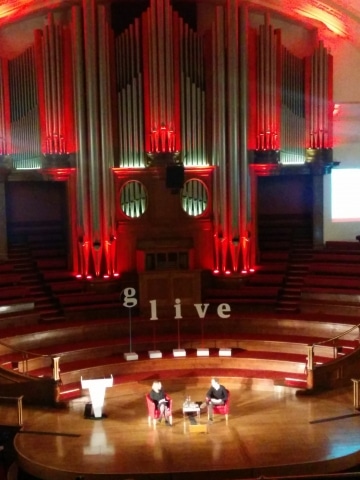The failure of the political establishment to deal with climate change has meant “there are no non-radical options left on the table,” Naomi Klein told an audience of 2,000 people in London last night.
The author of This Changes Everything: Capitalism vs The Climate said Keynesianism was not enough to deliver climate policy during a sell-out Guardian Live event at the Methodist Central Hall near the Palace of Westminster, London.
She said: “We have procrastinated for so long and allowed carbon emissions to rise year after year so there are no non-radical options left on the table. We cannot do this without radical changes to our political and economic system. This was not always so.”
She said that neoliberal think tanks like the Heartland Institute in Chicago immediately understood that climate change was evidence that free market ideology was dangerous – and therefore attacked the science.
Ideologically Heretical
“If it is true that industrial capitalism is destabilising the environmental system we are dependent on, they have lost the argument.
“And they understand that. That is why they deny the science. That would cause their whole world view to collapse. We have to regulate.”
She told the audience that climate scientist Professor Michael Mann had described “a procrastination penalty”.
This means the longer the wait, the more dramatic the needed response. “The solutions become ideologically heretical in our times.”
She pointed out that climate change was first seen as a political issue in 1988 – the year before the fall of the Berlin Wall. “This was the triumphant moment for neoliberalism.”
She went on to argue that climate change presented the perfect argument to create a world of progressive, fair taxation and regulations.
“Climate change offers the best argument we have ever had against the brutal logic of austerity,” she said. “When elites declare a crisis then money is no object. It is true that they cleaned us out at that last bailout.”
We needed to go back to “polluter pays…We have to go after those profits. Even nationalising the energy companies that are doing such a bad job of serving the public where a quarter of the public say they have not turned the heating on at points during the winter because of energy costs.
Rapid Transition
She gave the example of Germany where renewable energy had increased to 25 percent during an “incredibly rapid transition”.
This was achieved after hundreds of cities and towns voted to take back their grid from the private companies. Hamburg, she said, had recently voted to take its grid back. They were inspired by low carbon energy but also keeping profits.
However, she warned that Keynesian economics – where the state does attempt to plan and manage the economy through taxation and public spending – could not provide the solution.
“If we are not going to blow our carbon budget we need to cut emissions by eight percent to 10 percent a year. Keynesianism does not get us out.”
She said instead we needed a “people shock – a blow from below…We can liberate ourselves from the brutal logic of austerity.”
But she warned that a progressive revival was not the only way to deal with climate change – the alternative was an increasingly militarised and dangerous world.
She also argued that for every one job invested in oil and gas you get seven or eight from renewable energy and transport – but it has to be public investment.
“It is also a huge issue of political corruption in my country and this country, where there is merger of oil and state.”
Owen Jones, author of Chavs and The Establishment, was hosting the event and described climate change as “the existential threat to humanity itself.”
He said Klein had managed to show “the way society’s organising principle is profit for an elite is on a collision course with the future of humanity itself. It will be one of the most influential books of our time.”
Subscribe to our newsletter
Stay up to date with DeSmog news and alerts






